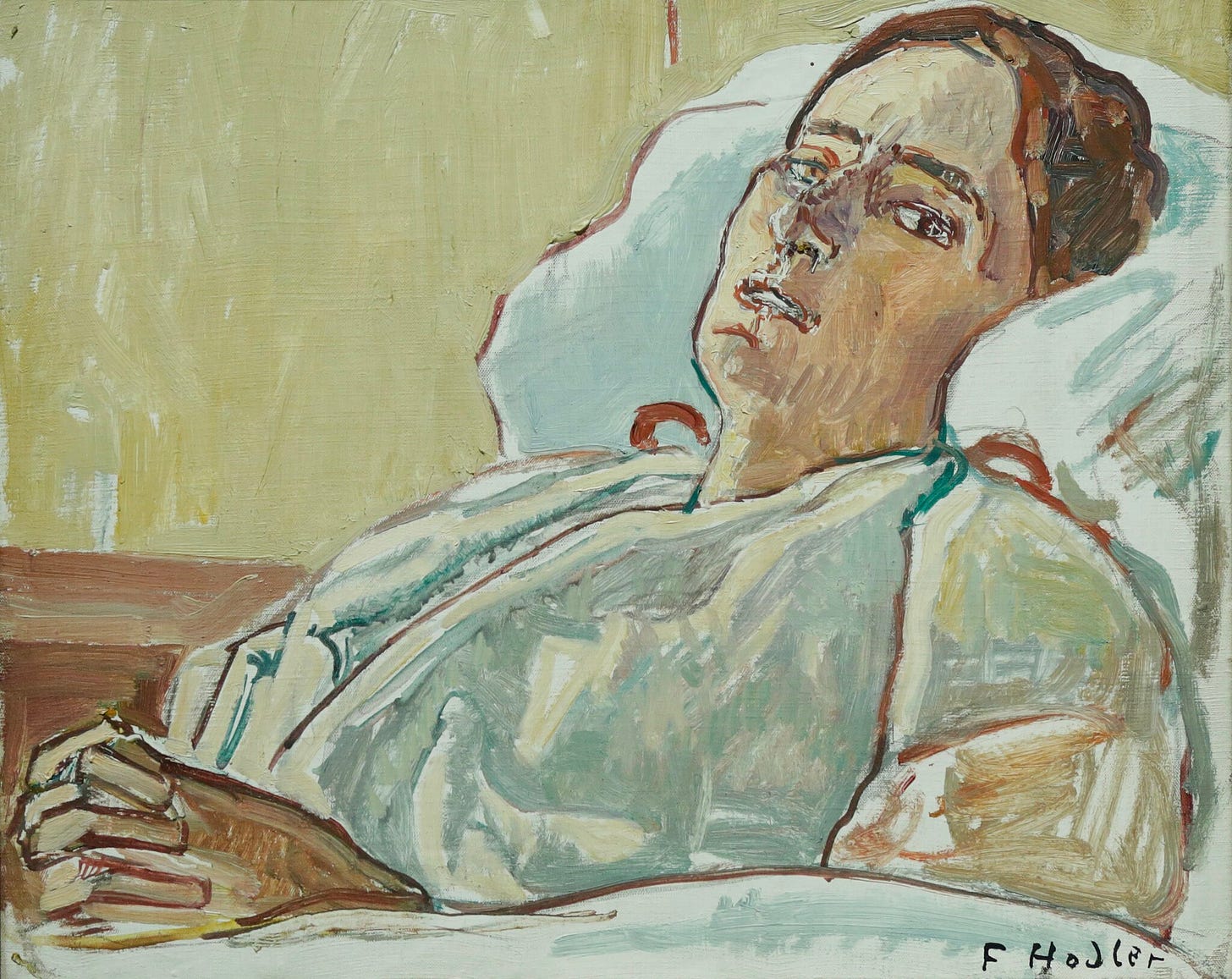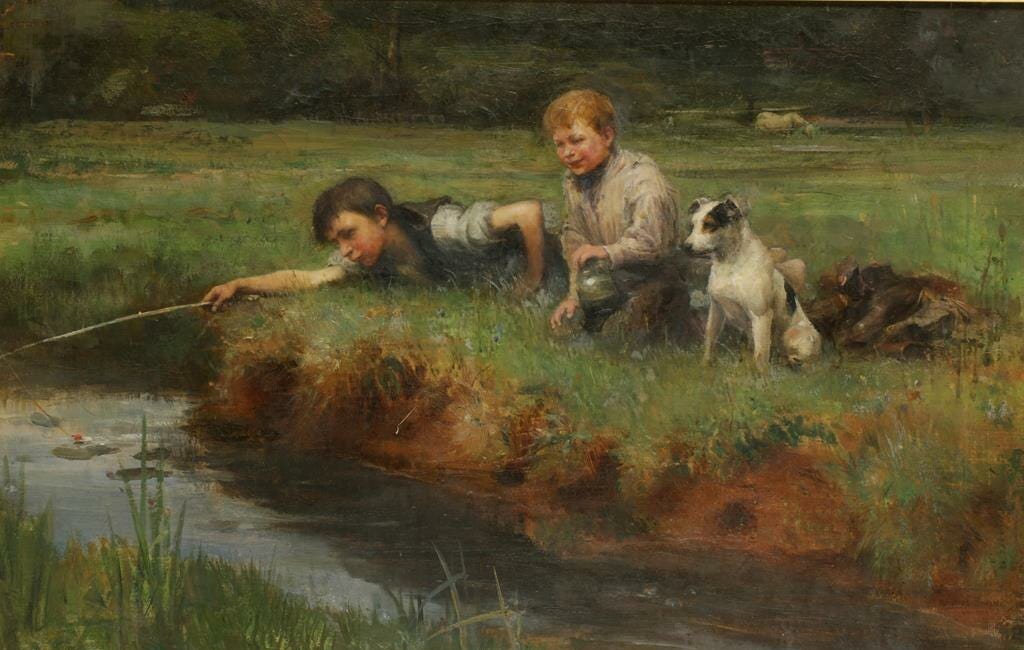Continued from Lena Hackley, Chapter I:
At home George, who of course believed this story with all his heart, since it was of a piece with the behavior of his father which he had seen, could hardly sit at the dinner table, watching his father eat—and how precisely, how correctly he ate, how revoltingly correctly!—without trembling in anger. How he wanted to spit in his face! If only the man would look at him!
But his father did not look at him. He was reading reports, and as a rule these absorbed him as deeply as others were absorbed by novels. George’s mother noticed only that he was not eating. She found this lack of appetite offensive, considering herself entitled to be offended as a child of the Depression—though indeed she had been comfortable enough at the time, during which her father had amassed most of his fortune, by both fair means and foul. She attacked her son:
“What’s the matter? Are you a vegetarian all of a sudden?” She said. “I wouldn’t be surprised, with the way you were blubbing over the mice in the traps downstairs.”
Still his father paid no attention—but Walter Jr. had regarded George throughout the meal with quiet compassion. As soon as the opportunity arose, two days later, he invited his brother out for a long walk in the patch of prairie a little ways from their house.
It was a fine August day, and the air was thick with swallows and the droning of cicadas. Without much prompting George told his brother the whole story. Walter Jr. was silent a while afterwards. At last he said:
“George, I love you, and that’s why I’m going to tell you something I’ve noticed. But I want you to remember why I’m telling you this—because I love you, and I want you to be happy. George, you seem to take on other men’s sins, and then torture yourself because you can’t pay for them all. What Dad did was wrong; but don’t you see who you’re hurting now, by hating him? Not Dad—only yourself. And all this while, he could be wrestling with it in his soul, he could be feeling this with him every day of his life.”
“That’s impossible—he doesn’t feel anything except greed.” George spat. The longer he listened to his brother the angrier he became.
Walter Jr. saw this, and saw, too, how his brother stared at the ground, grinding his teeth and kicking up stones and dust, blind to the swallows and the gently bowing grasses, shining golden as a woman’s hair, deaf to the quiet deliberations of the cicadas and grasshoppers; he saw all this, and his stomach churned with love for his brother, til he could have wept—but he was silent. Afterwards they never talked about the incident again.
It was shortly after this that George’s mind was rescued by science. His aptitude for learning had been distinguished early—yet for two or three years it seemed he was destined for poetry, and to die in a garret, if in that advanced age such a place was to be found. A charismatic teacher, however, Mr. Bowen, changed his mind, and in the course of one conversation.
This Mr. Bowen was young and a fervent idealist. He believed with Carl Sagan that we must conquer the final frontier, and make a second Eden out of a seemingly unpropitious planet, far far away. He was an excellent teacher. He truly felt it as his calling, loved children, and knew how to help them see the world more broadly and deeply, and introduce them to the wonders of the universe in a way at once comprehensible and exalting. George liked Mr. Bowen better than anyone, and often hung about after school to help him tidy his classroom, and to avoid going home. On this occasion it was the very beginning of the school year, the Autumn of that fateful year when Man had walked, or bounced, rather, on the moon. Mr. Bowen was naturally full of this momentous event, and had devoted the entire science class to its dissection. George considered this obsession of his idol to be slightly embarrassing. Full as he was of human suffering, it seemed to him the height of folly to go dressing up in expensive aluminum foil to dance on extraterrestrial deserts. He was therefore trying his teacher on this point of fanaticism, pestering him with all sorts of questions, in the impertinent manner of a child who is sure of everything. Fortunately Mr. Bowen was not of that stripe of teacher, who seems in a perverse sort of competition with his students, and sees all questions as blows in a battle of wills. He answered George’s questions patiently, ardent in his belief. As he remained patient and assured, George became more and more frustrated, til he blurted out the question nearest his heart:
“Well, what good does it do us?”
Ever the scientist, and fond of precision, Mr. Bowen smilingly asked what “it” might be?
But George could give him no more specific answer than to encompass the entire classroom in a gesture of his hand, as much to say he questioned the validity of the model solar system which hung from the ceiling, the illustrations of human bones and tissues on the walls and the chemistry sets neatly put away in a corner cupboard, all at once—in other words, Science herself came under his impressive scrutiny, and if she were found wanting, he was ready to sweep her away at once, with this same gesture of his hand.
Mr. Bowen thought for a moment. “Do you mean to ask, ‘how does the moon landing relieve human suffering?’”
George, surprised to find himself understood, replied in the affirmative.
“Well, I can’t give you the exact cause and effect, to prove beyond a doubt that the moon landing will erase all suffering, but I can tell you why I believe science in general is our greatest hope for a perfect world—and beyond.”
It turned out Mr. Bowen had a very good reason for his unshakeable faith in science. He had been born in Peoria, Illinois, and had been three years old when the United States joined the war. His father had enlisted at once, leaving Mrs. Bowen to look after their five children. This formidable lady was more than equal to the task, and took work in a factory to help clothe and feed her children, who were all too young to work themselves. Mr. Bowen remembered being proud of his mother, and feeling she was as indestructible a lady as the Statue of Liberty.
A bad fever struck that winter, and one of Mr. Bowen’s sisters fell ill. Mrs. Bowen nursed her through it, before succumbing herself. Mr. Bowen remembered all his days the sight of his mother lying on her bed, shivering and groaning. Nor did she get better; she developed rheumatic fever. Gradually her condition became very serious, until one night it took a turn for the worse. The doctor was called, but he was unable to come until the next morning. The pastor, meanwhile, came, and sat with Mrs. Bowen a long while. Mr. Bowen had been forbidden from his mother’s room, to prevent infection, but he could not resist peeking in. At the sight of him Mrs. Bowen lost her composure and began sobbing like a child. He was her youngest son.
“Take care of my baby,” she said, and Mr. Bowen knew in that moment, for the first time in his life, that his mother would die.
The next morning the doctor came. He was a brusque man, but a kind one. After examining Mrs. Bowen, he told her she was going to live, and administered a first dose of penicillin. Mrs. Bowen indeed recovered; and even as Mr. Bowen and George talked, she was alive and well, settled with his father in a bungalow nearby.
“The pastor talked a lot about how my mother would be free from suffering in the next world,” Mr. Bowen said, “but the doctor took away her suffering completely—not only that, he took away my suffering, and my siblings’ suffering. My father got to come home after the war to his wife. All that wouldn’t have been possible without a scientist and his petri dish.”
This story had on George a great and increasing effect. In fact this one conversation changed the whole course of his life. It seemed to him that the chance to entirely do away with suffering was actually at humanity’s fingertips, and gave meaning to the suffering of which he had read—it placed that misery in a context and a story whose ending would ultimately and perhaps even very soon be happy. Yes, and he himself would be one of the heroes to bring this about—that gave his young life its purpose, and he threw himself wholly and joyfully into this great cause.





